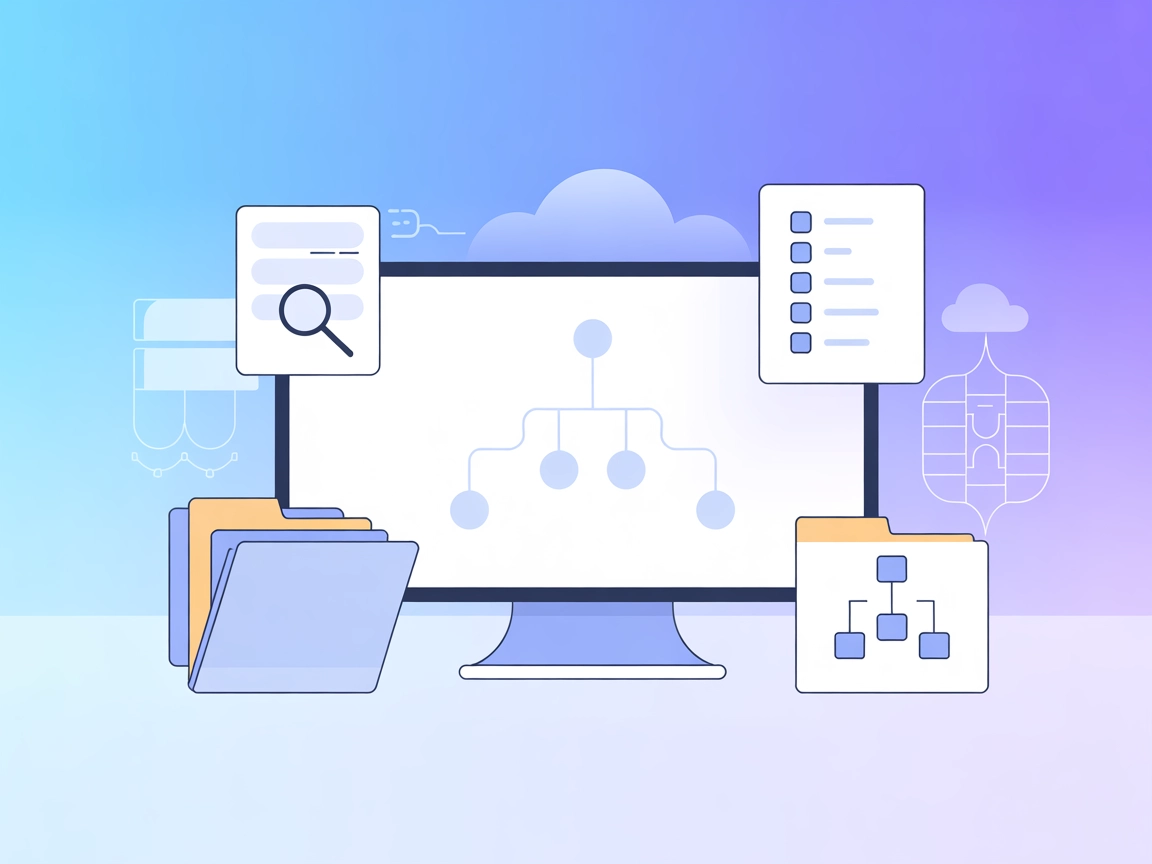
Mindmap MCP Server
The Mindmap MCP Server transforms Markdown documents into interactive mindmaps, empowering developers, educators, and AI assistants to visualize hierarchical in...

Connect your AI agent to XMind mind map files. Search, extract, and analyze mind maps with advanced tools for smarter project management and knowledge workflows.
FlowHunt provides an additional security layer between your internal systems and AI tools, giving you granular control over which tools are accessible from your MCP servers. MCP servers hosted in our infrastructure can be seamlessly integrated with FlowHunt's chatbot as well as popular AI platforms like ChatGPT, Claude, and various AI editors.
The XMind MCP (Model Context Protocol) Server is a specialized tool that connects AI assistants to XMind mind map files, enabling seamless analysis and querying of mind maps. By acting as an interface between AI agents and XMind data, it allows developers and AI systems to perform advanced operations such as searching, extracting, and analyzing content from XMind files. This enhances development workflows by supporting tasks like smart fuzzy search, task management, hierarchical navigation, link extraction, and multi-file analysis. The server is particularly valuable for teams who need to automate the exploration, organization, and processing of knowledge stored in XMind formats, making it easier to surface relevant insights and interact with complex mind map structures programmatically.
No explicit prompt templates are listed in the repository.
No specific MCP resources are defined in the repository documentation.
windsurf.config.json).mcpServers object:{
"xmind": {
"command": "npx",
"args": [
"-y",
"@41px/mcp-xmind@latest",
"/path/to/your/xmind-directory"
]
}
}
If your configuration requires authentication or environment variables, include an env section:
{
"xmind": {
"command": "npx",
"args": [
"-y",
"@41px/mcp-xmind@latest",
"/path/to/your/xmind-directory"
],
"env": {
"API_KEY": "${API_KEY}"
}
}
}
claude_desktop_config.json.{
"xmind": {
"command": "npx",
"args": [
"-y",
"@41px/mcp-xmind@latest",
"/path/to/your/xmind-directory"
]
}
}
{
"xmind": {
"command": "npx",
"args": [
"-y",
"@41px/mcp-xmind@latest",
"/path/to/your/xmind-directory"
],
"env": {
"API_KEY": "${API_KEY}"
}
}
}
cursor.config.json).{
"xmind": {
"command": "npx",
"args": [
"-y",
"@41px/mcp-xmind@latest",
"/path/to/your/xmind-directory"
]
}
}
{
"xmind": {
"command": "npx",
"args": [
"-y",
"@41px/mcp-xmind@latest",
"/path/to/your/xmind-directory"
],
"env": {
"API_KEY": "${API_KEY}"
}
}
}
cline.config.json).{
"xmind": {
"command": "npx",
"args": [
"-y",
"@41px/mcp-xmind@latest",
"/path/to/your/xmind-directory"
]
}
}
{
"xmind": {
"command": "npx",
"args": [
"-y",
"@41px/mcp-xmind@latest",
"/path/to/your/xmind-directory"
],
"env": {
"API_KEY": "${API_KEY}"
}
}
}
Using MCP in FlowHunt
To integrate MCP servers into your FlowHunt workflow, start by adding the MCP component to your flow and connecting it to your AI agent:

Click on the MCP component to open the configuration panel. In the system MCP configuration section, insert your MCP server details using this JSON format:
{
"xmind": {
"transport": "streamable_http",
"url": "https://yourmcpserver.example/pathtothemcp/url"
}
}
Once configured, the AI agent is now able to use this MCP as a tool with access to all its functions and capabilities. Remember to change “xmind” to whatever the actual name of your MCP server is and replace the URL with your own MCP server URL.
| Section | Availability | Details/Notes |
|---|---|---|
| Overview | ✅ | |
| List of Prompts | ⛔ | No prompt templates specified |
| List of Resources | ⛔ | No explicit resources listed |
| List of Tools | ✅ | Eight tools detailed in README |
| Securing API Keys | ✅ | Supported via env block in configuration |
| Sampling Support (less important in evaluation) | ⛔ | Not mentioned |
Support for Roots: Not specified
Support for Sampling: Not mentioned
Based on the available documentation, XMind MCP Server provides strong tool coverage and clear setup guidance, but lacks explicit details on prompt templates, resource primitives, and advanced MCP features like roots and sampling. Overall, it is practical for mind map analysis but not fully mature in the broader MCP ecosystem. My rating: 6/10.
| Has a LICENSE | ⛔ (No LICENSE file found) |
|---|---|
| Has at least one tool | ✅ |
| Number of Forks | 5 |
| Number of Stars | 25 |
The XMind MCP Server connects AI agents to XMind mind map files, allowing them to search, extract, and analyze mind map content for smarter workflows and knowledge management.
It offers tools for reading XMind files, extracting TODO tasks, scanning directories, searching files and nodes, and comparing content across multiple mind maps.
Common use cases include project and task management, knowledge base exploration, multi-file analysis, content extraction, and automated organization of mind map repositories.
Add the MCP server configuration to your preferred client (Windsurf, Claude, Cursor, or Cline) as shown above, specifying your XMind directory path and any necessary API keys via environment variables.
Yes, API keys and other authentication can be managed by adding an 'env' block to your MCP server configuration.
Easily analyze and automate your mind map workflows with FlowHunt’s XMind MCP Server integration.

The Mindmap MCP Server transforms Markdown documents into interactive mindmaps, empowering developers, educators, and AI assistants to visualize hierarchical in...

The Model Context Protocol (MCP) Server bridges AI assistants with external data sources, APIs, and services, enabling streamlined integration of complex workfl...

The ModelContextProtocol (MCP) Server acts as a bridge between AI agents and external data sources, APIs, and services, enabling FlowHunt users to build context...
Cookie Consent
We use cookies to enhance your browsing experience and analyze our traffic. See our privacy policy.